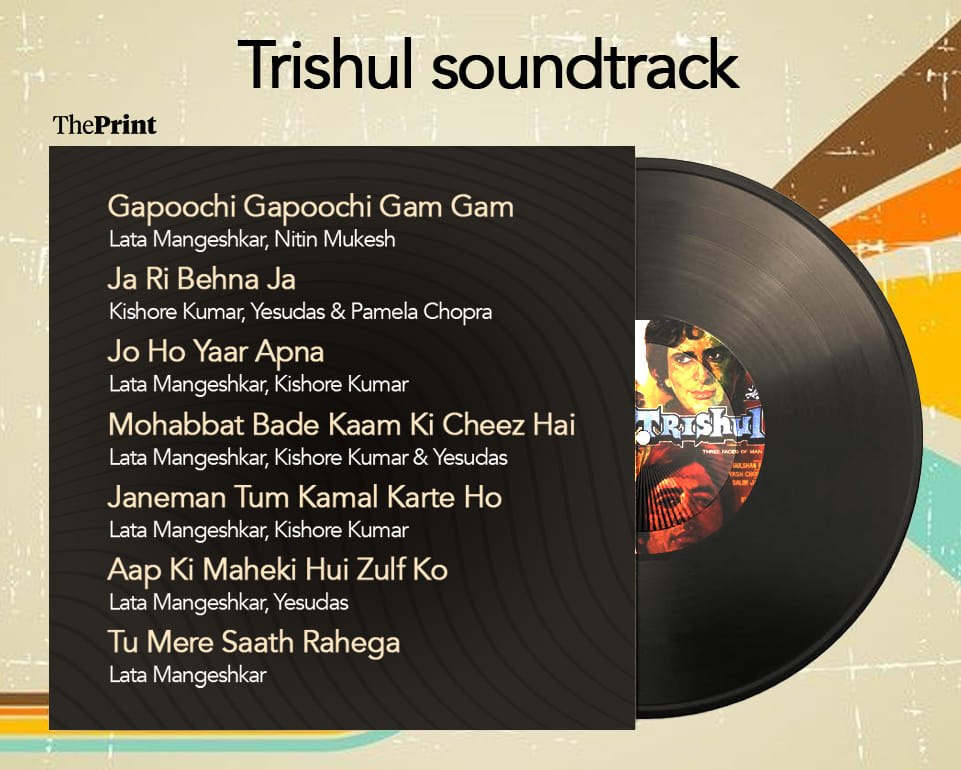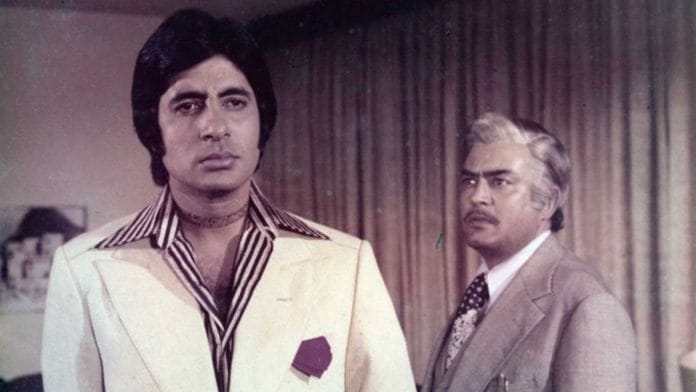Nineteen seventy-eight was the year Amitabh Bachchan graduated from being a star to a superstar of Hindi cinema—Kasme Vaade, Muqaddar Ka Sikandar, Don, and Trishul. Apart from showcasing Bachchan’s quintessential ‘angry young man’ persona, Yash Chopra’s Trishul tested his emotional spectrum as an actor, and he came out with flying colours. That is what differentiates the film from the other hits of the year.
Trishul, a family revenge saga that combines elements of betrayal, brotherhood, and loyalty, became the second-highest grosser of the year. Written by Salim Khan and Javed Akhtar, the film had some of Hindi cinema’s biggest stars – Rakhee, Hema Malini, Shashi Kapoor, Sanjeev Kumar, Waheeda Rehman, Poonam Dhillon, and Sachin Pilgaonkar.
Raj (Sanjeev Kumar) marries Kamini (Gita Siddharth) for money and abandons his pregnant girlfriend Shanti (Waheeda Rehman), who ends up raising their son Vijay (Amitabh Bachchan) alone. When Vijay learns about his father’s existence after Shanti’s death, he vows revenge. Raj, now a prominent businessman, leads a happy life with his children, Shekhar (Shashi Kapoor) and Kusum (Poonam Dhillon). Vijay walks in with no money but a plan to bring Raj to his knees.
Salim-Javed, basing the plot heavily on a man born out of wedlock and a mother who died in penury, set the revenge plot early in the movie. Raj’s character as a wealthy Delhi businessman further accentuates the rich-poor divide, a trope often applied by the writer duo in their films.
Chopra spends enough reel time placing Delhi and its elite—construction companies, big money, contracts, power, and family-run businesses. The director takes the viewers to places such as Lodhi Gardens and Golf Club, Teen Murti, and Odeon theatre. The movie also offers a glimpse of Delhi’s iconic monuments through romantic numbers such as Gapoochi Gapoochi Gam Gam by Lata Mangeshkar and Nitin Mukesh. The film’s climax scene was shot at Pragati Maidan.

Masala meets emotion
While Deewar set the benchmark for drama-heavy dialogues in the Hindi cinema of the 1970s, Trishul, too, carries some powerful writing that stays with the audience to date.
“Main paanch lakh ka sauda karne aaya hoon…aur meri jeb mein paanch phooti kaudiyaan bhi nahin hai (I’ve come to strike a deal worth Rs 5 lakh when I don’t even have five broken cowries in my pocket),” immortalised Vijay’s character. Still unaware of his son’s identity, when Raj tends to an injured Vijay, the latter says “Mere zakhm jaldi nahi bharte (My wounds don’t heal fast)”. Bachchan’s delivery sums up the emotional pain of his character in a few words.” There is always more to the screen than what one sees and hears. That is the depth Chopra was able to achieve.
Building on his angry young man image, Bachchan in Trishul is at the top of his acting game—playing the son who was abandoned by his father for wealth. His character has shades of an anti-hero as he meticulously plans revenge, isolating Raj. Vijay does not raise his voice much—a departure from the black and white expression of anger that was the norm of the masala films of that era. Some compelling scenes pit Bachchan’s character against Sanjeev Kumar’s and Shashi Kapoor’s. Notably, Kapoor and Bachchan appeared in multiple films together – Deewar, Suhaag, to Silsila – either playing friends or siblings. The chemistry between the two rivalled that of romantic pairs.
Sanjeev Kumar, set up as a proverbial villain for choosing Kamini over Shanti, plays Bachchan’s father convincingly. The writers have made sure to keep his character just as villainous as would fit a family drama. There is no inherent flaw in his character except his history, which leaves scope for reconciliation toward the end. Silver-haired and puffing on his cigarette, Kumar plays the role of a wealthy builder to the hilt.
Among the female cast, the bigger role is helmed by Rakhee, who plays Geeta, Vijay’s trusted associate and emotional support anchor. Hema Malini and Poonam Dhillon have relatively smaller roles as Shekhar’s girlfriend and sister, respectively. Despite limited screen time, they manage to inject their characters with personality. Waheeda Rehman establishes the crux of the story in her cameo role as Vijay’s mother, telling him all about her past. Kamini (Gita Siddharth), however, is merely used as a prop in the movie. She is married off to Raj as per her father’s wishes, and barely has any say in her husband and children’s lives.
Trishul came when Salim-Javed were at the high point of their creativity and Bachchan at the top of his stardom. By the time the film was conceived, the writer duo could simply base any story around the actor, and it would be a hit—or so it seemed. The result, here, was no different.
Views are personal.
(Edited by Zoya Bhatti)






